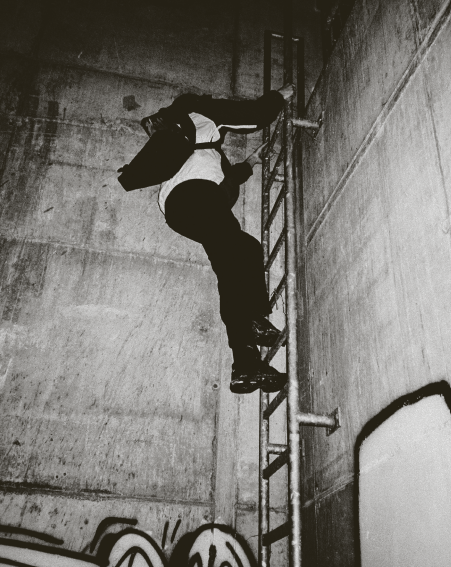Why you can’t (yet) imagine a liberated society
Everything is as usual: working, renting, buying, owning. We go to work 40 hours a week, we pay with our time and energy and get money in return, we are stressed and sometimes it makes us ill. The existing social conditions seem predetermined and natural. Capitalism envelops our lives, actions and thoughts like a bell jar. It creates an atmosphere that permeates culture, work and education. Stale air that has been marketed for centuries as the best air to breathe. Fact, natural, just air. The stench of capitalism is not only seen as the only possible system. It is (almost) impossible to even imagine an alternative. The oxygen of capitalism is clearly growth and the eternal expansion of the market. Mental health and environmental resources are seen as given, endless nutrients.
The capitalist bell jar covers all social structures. Healthcare and education systems are run like businesses: bigger, faster, cheaper. But the system also depends on the cooperation of the majority. Quite »naturally«, personal decisions are also made according to the logic of capitalist thinking. So we choose the more annoying job in order to earn more money, perhaps to save money, perhaps to buy a flat one day, which may then be paid off one day. Possessions are conveyed as security, and security feels good. But it is not only possessions that are permeated by capitalism, but also needs, feelings and personal values.
Terms such as work-life balance are directly linked to self-optimisation: Once the work is done, life must be used effectively. Sport, healthy eating, gardening projects and barista courses should be planned. And if you have difficulty doing so, there are life coaches you can pay for with your work money to make your life better. Great!
»Bad romance«
Even in love, relationships are calculated, compared and tested for their usefulness. Dating apps encourage us to market ourselves and pack our complexity into a scroll moment for an anonymous audience. And we, too, consume people like an assembly line, weighing up whether height, the desire to have children and the cute dog in the third picture are right for us. The recipe for success for many matches is a linguistically inventive text and a physically conventional appearance. The selection is huge. To be more efficient, emojis such as peaches or flames are used, and on first dates, the same questions are asked in a script-like manner in order to be able to compare. And finally, the all-important question: Could there be anything better on the love market?
The capitalist bell jar encompasses all social conditions: Naturally, rent costs money, naturally, good grades are important, naturally, a successful career is sexy, naturally, retirement planning is important, naturally, I have to pay at the supermarket, naturally, I can pay for sex, naturally, some people have more power than others, naturally, countries need to arm themselves and people need passports, naturally, there are forest fires and floods, naturally, there is the police, naturally, there is racism, antisemitism, ableism and sexism in Germany, naturally everyone is closest to themselves. Naturally, it can’t be any different.
»It’s me, hi, I’m the problem, it’s me.«
Even leftists are not immune to this apparent lack of alternatives. Many have lost hope and no longer even try to change anything politically. Or they make political demands, but only aim for small changes in the big picture – no longer as a supplement, but as a substitute for revolution. It’s like politics under a bell jar: The dome remains, but perhaps the smell underneath can be made a little more bearable. Others devote themselves to blind activism: In the face of the current crises and catastrophes, they kick wildly at the dome in the hope that something will happen – and in doing so, they only break their own feet. The impossibility of a completely different world has also been internalised here.
We are all part of capitalism, which we live in and which has been modelled and taught to us from an early age. Just as we learned to walk, we also learned to buy. But according to the motto »Don‘t blame the clown if you are in a circus«, it is worth questioning this social reality. It is worth taking a break, taking a deep breath and asking ourselves whether the air isn’t actually making us sick. Whether what is declared to be normal is also natural. Spoiler: It is not. So what is real and what is just being sold to us?
»Love the way you lie«
A moral critique of capitalism, according to which only its symptoms such as war and poverty need to be combated, is futile. The core idea is not questioned in this way. The same applies to criticism of individuals who are used as the face of impersonal and abstract capitalist processes. Elon Musk or Jeff Bezos may be hard to bear, but if they were gone, the system would still be there. Instead, it is important to unveil the supposedly natural status quo and reveal the actual reality. Conditions do not have to be the way they are now, and expectations of people are constructed.
What is real, for example, are environmental disasters, the climate crisis and the impending end of natural resources. The problems are concrete and frightening: forest fires, floods, extinction of species and ever-growing danger zones. Only in a fantasy world can these challenges be overcome with electric cars, green electricity and caps that are secured to plastic bottles. But the fact is: Environmental disasters are increasingly man-made, will not simply stop, and cannot be treated with capitalist band-aids.
Equally real are mental disorders such as depression and burnout, which have become commonplace. Precisely because they are commonplace, it is important to politicise them and highlight how great the quality of life under capitalism really is. Instead of questioning why so many young people suffer from stress, anxiety, negotiation and competition, the individual is held responsible. The source of happiness lies within you! But in reality, it’s different: You can’t always succeed just because you really want to. And those who suffer from physical illnesses such as ME/CFS, which completely incapacitate those affected, are literally silenced. Anyone who becomes useless in the capitalist apparatus is out of luck. But in reality, it’s different: You are not only worth something if you work.
»The rest is still unwritten«
We won’t be able to deliver a sophisticated utopia or a single master plan. This is also due to the nature of utopia itself, which is constantly evolving and therefore not a fixed plan. It is more about questioning the naturalisation of circumstances in order to be able to think about alternatives (again) in the first place.
In addition to questioning the status quo, however, it also helps to recognise the possibility of utopia. A look at the past shows that what was once considered impossible seems feasible today or has even become reality. women’s suffrage, for example, or travelling to the moon. And vice versa: What once seemed realistic is now seen as impossible. In 1918, a liberated society seemed much closer than it does today, as you can read in this article.
Ultimately, the most important thing for all these approaches is to create spaces for exchange with one another. This can happen in organised groups as well as in conversations with friends. To take small steps in the right direction, it helps to think big, speak up and allow yourself to dream of something better. The capitalist bell jar could crack if many people think about fresh air.
For further reading:
Mark Fisher: Capitalist Realism. Is There No Alternative? 2009. €12.
Eva Illouz: Cold Intimacies. The Making of Emotional Capitalism. 2007. €17.


